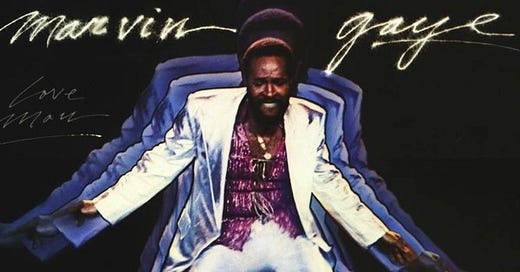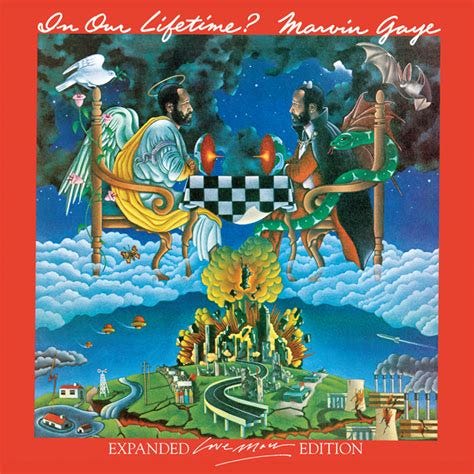Picture it, the year was 1979. Jimmy Carter was president, inflation was raging on gas prices in the street, and disco was in its last year of life. In the middle of all of that, Marvin Gaye was also spiraling into his own chaos of sorts. The falsetto soul singer was in the throes of bankruptcy, a second failed marriage, serious substance abuse issues, a deteriorating relationship with Motown Records for a host of different reasons, and an inability to get a hit song on the charts. Trying to get his career and his paper back on track, Gaye set out to redefine his fractured career with a new project and stage persona motif Love Man.
While Gaye was enthusiastic about his new creative process, his record label was less than impressed with his scratch tracks upon listening to them, especially after Gaye vehemently refused to do any disco themed songs. After much creative fighting from both sides, Motown Records (under the Tamla imprint Gaye recorded on) mixed, mastered, released, rebranded and retitled Love Man into In Our Lifetime? without Gaye’s approval. Such source of contention was the final straw for Gaye, who was pissed off Motown Records changed his album cover to religious mockery and cherry picked his demo tracks and staunchly refused to promote the records, opting to retreat into sabbatical in Belgium until he could legally get out of his contractual obligations and financial issues in America.
Initially released as a lead single on the long forgotten 45 format, Ego Trippin’ Out was quickly pulled and vaulted from rotation as Marvin Gaye’s hardcore fans were having a hard time accepting anything from him that wasn’t a sensually dripping sex song at the time, making sales low and the release another Motown Records failure. As a result, the general public was design hearing the full collection of Love Man cuts that did not make it on In Our Lifetime? until its 1994 re-release, which was largely ignored on the musical landscape.
Forever known as a forgotten deep cut that many will argue was not fully finished, Ego Trippin’ Out is now posthumously and infamously known as one of the first solo hip-hop songs as well as being in the first hip-hop beef song on wax, the first hip-hop track to promote a lavish lifestyle, the first to have a sixteen bar verse followed by a sung hook, and the first to effectively harmonize lyrics on a hip-hop cut far before Bone Thugs-N-Harmony made it fashionable. On a more somber note, Gaye could technically be the first lyricist on wax to also be murdered, which we all well know has become synonymous with the genre.
For those that are not hip to the cut, Ego Trippin’ Out is Gaye’s seven and a half minute tour de force hip-hop opus of what a boss he is out here in these streets. Before Notorious B.I.G. or Big Pun were out here telling you what types of lovers and businessmen they were despite their physical flaws, Gaye’s Ego Trippin’ Out was the first to put it on parade. With a bravado that only the arrogant could understand, Ego Trippin’ Out is an intimate workshop on how women get turned out by the Love Man when their men at home are failing on their business and in the bedroom, complete with a name check on cars, designer clothes, and other recreational vices that are par the course for a player.
Don’t get it twisted, Ego Trippin’ Out is a double entendre contradiction walking.
In the first and second verse Gaye lets it be known he is the biggest Ego Trippin’ Out in the room in a style that could be argued is more of an exploration of himself through parody rather than literal interpretation, since the verse transitions into a cautionary tale chorus that criticizes the consequences of being a boss. While embracing being the best lover and best business man, Gaye quietly reminds us that if anybody knows too well the consequences of the ego, it’s him. His acceptance of his narcissism and subtle apology for his actions comes off smooth in his falsetto vocals, which serves as a battleground of his consciousness as he struggles coping with the highs and lows of his status and position.
On the flip side, Ego Trippin’ Out is the ultimate diss to Gaye’s contemporaries in the music industry, allegedly directed towards Teddy Pendergrass and Rick James in part to their complicated association due to his second wife Janis Gaye’s intimate relationships with both during their marriage. Gaye holds back no punches taunting them without naming names that his women are just using them for their lavish lifestyles and excessive vices; once their usefulness is over the ladies whom temporarily came into their fold will inevitably find their way back to him because he is the ultimate boss on the block and their worldly possessions nor their game is not strong enough to hold them in their keep.
Forty five years later, Ego Trippin’ Out can hold its own against any hip-hop record out today. The untapped potential that Gaye left on that record will forever be a loss to the genre, as soul singers like him were eager and ready to transition their sound and style into a modern and fresh direction, which would have led to incredible collaborations and changed the trajectory of hip-hop for the better. Motown Records, like many labels of the late 1970s, were too stuck in the past to embrace the burgeoning hip-hop future and wasted the record, something that would plague the label into insolvency by the 1990s. To Gaye’s credit he forced Berry Gordy, for better or worse, to stop having a generic imprint sound and to embrace the creative genius and contributions of its artists; there is no better example of this than Ego Trippin’ Out.
Sadly, Marvin Gaye joins the pantheon of lyricists at their peak we lost too soon.







Trouble Man!
Agree on all points. The original mix is very much an idea demo. Motown didn't know what way Marv was going with the song and did it a miscarriage of justice mixing it like one of their factory songs. Would have been more interested in Marvin's original creation than the Motown machine interpretation.